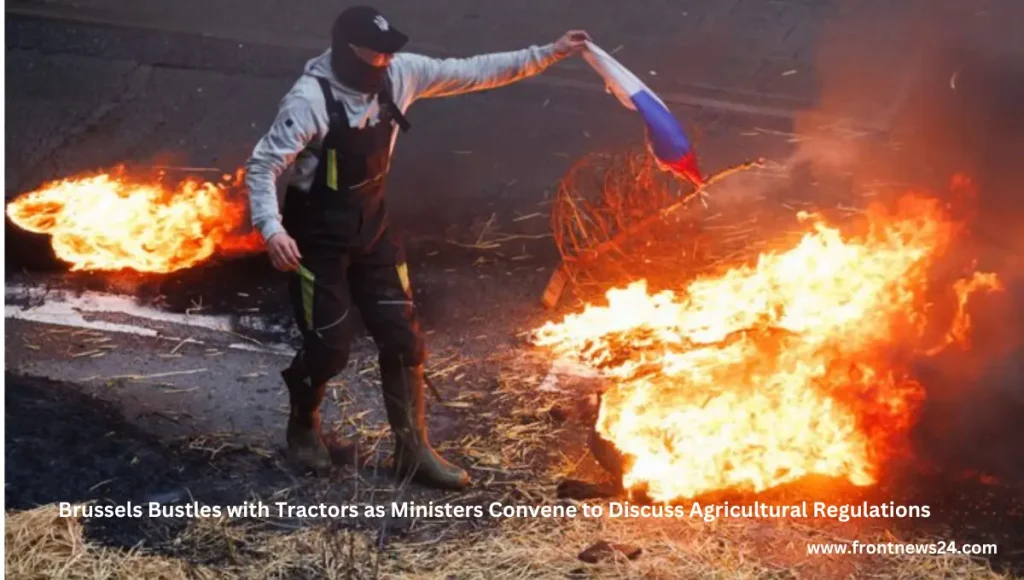On February 26th, Abu Dhabi will host the 13th ministerial conference of the World Trade Organization (WTO). While the connection between this summit and the struggles of impoverished farmers worldwide may not be immediately apparent, a direct link exists.

On that day, members of the European Coordination Via Campesina (ECVC), representing small-holder farmers in 21 European countries, will protest against the long-standing neoliberal agricultural policies promoted by the WTO. These policies have systematically impoverished farmers, a crisis underscored by ongoing protests across Europe since January.
Breaking Point: The Struggle of European Farmers – Neoliberal Policies and the Income Dilemma
These farmers, the backbone of Europe’s food production, whether conventional or organic, on a small or medium scale, share a common frustration—years of relentless work without a decent income. The root cause lies in decades of neoliberal agricultural policies and free trade agreements. Production costs rose steadily, while farmers’ incomes stagnated or declined.
Faced with this predicament, some farmers tried to compensate by increasing production, acquiring more land, investing in machinery, and accumulating debt. Others sought better prices through organic farming and short distribution channels, but many faced market collapses due to the COVID-19 pandemic.
Rising Giants: Agroindustrial Power, Farmer Mobilization, and the Struggle Against Destructive Agricultural Policies in Europe
Meanwhile, large agroindustrial groups grew stronger through mergers and speculation, exerting pressure on prices and farming practices. ECVC actively participated in farmer mobilizations, recognizing the EU’s adoption of WTO-promoted deregulation and destructive international competition as culprits.
Since the 1980s, regulations ensuring fair prices for European farmers were dismantled in favor of free trade agreements, pitting global farmers against each other. Despite recent intentions for a more sustainable agricultural model, such as the Farm to Fork Strategy, the EU has not broken away from the logic of international competitiveness.
Farmers organizations welcomed sustainability ambitions but emphasized that achieving an agroecological transition requires protecting agricultural markets. Unfortunately, these pleas went unheard, and European farmers found themselves torn between delivering an agroecological transition and producing at the lowest possible price.
Differences between farming organizations surfaced, with some, tied to Copa-Cogeca, advocating for the withdrawal of environmental measures in the EU’s Green Deal. In contrast, ECVC and others insisted on addressing the environmental and climate crises while challenging the neoliberal framework.
Challenges Ahead: EU-Mercosur Trade Concerns, Green Deal Setbacks, and the Call for Farmer Empowerment and Global Cooperation
The proposed EU-Mercosur free trade agreement, if enacted, could further harm European livestock farmers by increasing imports from Mercosur countries and potentially lowering prices. ECVC advocates for international trade based on food sovereignty, ensuring it doesn’t harm local production or small-scale producers’ livelihoods.
Instead of supporting farmers in transitioning to agroecology, the EU reversed a key provision of the Green Deal by halving pesticide use by 2030. Some European countries abolished environmental measures while maintaining neoliberal policies, risking a continuous escalation of farmers’ protests.
Read also: Wipro and Nokia Unveil Cutting-edge 5G Wireless Connectivity Solution for Corporate Entities
This occurs against a backdrop of rising far-right movements globally, exploiting farmers’ anger to advance anti-system and anti-ecology agendas. The EU’s inconsistent response to farmers’ protests may contribute to this trend, with potential consequences in the upcoming European Parliament elections in June.
ECVC asserts that real solutions for European farmers lie in market regulations and the promotion of food sovereignty, collaborating with Southern countries. As farmers align with workers’ unions and the climate movement, they demand fair incomes and coherent policies to address the global climate emergency amidst a backdrop of escalating capital income.